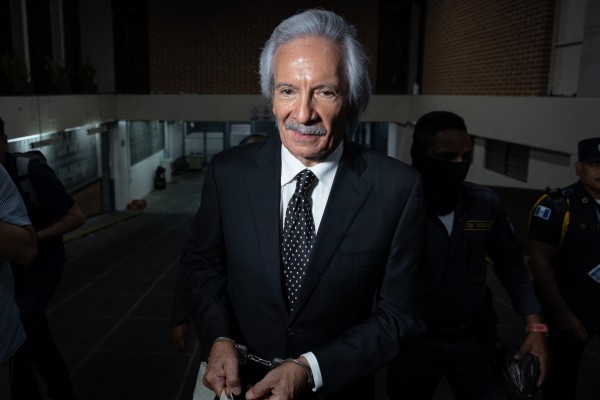A closure order against Venezuelan weekly newspaper Sexto Poder was revoked yesterday, after a week of domestic and international protest. Pedro Arangúren, a legal representative of staff from the media outlet, told the local press that the journalists would be in charge of the publication from now on, since its director, Leocenis García, is still being prosecuted by the authorities.
On 20 August, the newspaper published an article entitled “The Powerful Women of the Beautiful Revolution”, in which a group of senior female officers were shown in a photo montage as cabaret dancers. The text said that the women had a “specific role in the cabaret, which is lead by Mister Chavez” – an apparent reference to Venezuelan President Hugo Chavez.
The officials on the cover said that the publication had damaged their reputation, the local press reported. Luisa Estella Morales, president of the Supreme Court, filed a complaint and ordered the detention of editor Dinorah Girón, and the newspaper’s director, Leocenis García. On 22 August a judge permanently barred the newspaper from publishing or distributing copies.
In a related development, a day after the article in question was published, Girón was arrested by the Bolivarian Intelligence Service, and was charged with “incitement to hatred, insulting a public official and publicly denigrating women”. She was released later in the week, but must appear in court every 15 days. She is not allowed to participate in public gatherings, to leave the country or to express opinions in any media regarding the case.
Garcia’s whereabouts are unknown; last week he published a statement in El Nacional newspaper saying he was in hiding because he was a victim of political prosecution. After the court revoked the ban, he told local media he would appear in court within the next 48 hours.
Sexto Poder’s director was imprisoned from 2008 to 2010; observers said the case was political. His sister, María Lucía García, said she had been followed recently and that unidentified people had called at her door asking to talk to her. Last weekend, someone threatened her from a dark car. “Tell your brother to surrender to the authorities. Otherwise, we are going to kill him,” they shouted.
Meanwhile, Aranguren, Sexto Poder’s legal consultant, told local newspapers that the government was looking at a money laundering charge to justify García’s detention, because the current charges did not warrant his imprisonment.
And in another twist, Blanka Eeckhout, a pro-government leader and second deputy speaker of the National Assembly said that the newspaper receives foreign funding, paving the way for the authorities to investigate not only the article, but the entire publication.
She said that image offended six women who lead public institutions and was part of a campaign against the government, local press outlets reported. “This campaign seeks to delegitimize, discredit and justify violent actions,” she added.
Marco Da Costa, assistant to the president of the weekly newspaper expressed his concern during a press conference last week: “Once again they are closing a media outlet. They are harming freedom of expression (…). We are being hit. “
In a statement, newspaper staff said: “The ruling marks a dangerous precedent, because it indicates that a media outlet can be closed without even a prior investigation. It also violates the right to freedom of expression and the right to work.” They believe that the ruling was political and said that they have in the past published whole-page interviews with pro-government officials, and satirical articles about opposition leaders. “Why were the authorities not as diligent in condemning us when we published those photo montages?” they asked wryly.
After the fining of Globovision, the closure of RCTV and 34 radio stations, and censorship targeting major newspapers El Nacional and TalCual, this case is the first time that a print media outlet in Venezuela has been shut down by Chavez´s government.
“This decision … is a blatant attack against freedom of expression and free access to information, and places in question the impartiality of a judicial system which is quick to pursue legal cases promoted by senior government officials and representatives, but acts slowly in cases brought by ordinary people, or the managers of independent media,” the National Guild of Journalists (CNP) said.
Although the CNP criticized publication of the image, it said that the arrest of the editor, the conditions of her release and the ban were “violations of due process and of the right to freedom of expression”. It also recalled that the board of the National Association of Journalists had called on the authorities to bring to justice those involved in the assault against 12 journalists severely beaten on 13 August 2009 by alleged government supporters. Two years later, the aggressors remain at large.
Under the new court ruling, Sexto Poder is barred from publishing information containing graphic or textual material which “offends or insults the honor or reputation of public officials, or which exposes them to public hatred”. It also prohibits the publication of content “insulting and offending females”.
The court ordered the removal from circulation of all copies of the 20 August edition still available to the public or disseminated in other media.
International Press Institute (IPI) Director Alison Bethel McKenzie said: “We are delighted that the order against Sexto Poder has been revoked, but strongly condemn the fact that it was ordered closed in the first place. Closing a newspaper, or any media, only affects Venezuelan democracy and citizenship. We call on the authorities to completely decriminalize defamation.”
She also expressed her concern about what the court would decide about Leocenis García and Dinorah Girón: “We hope their political and editorial stances will not influence any ruling, a situation which is sadly extending in many countries of Latin America.”


